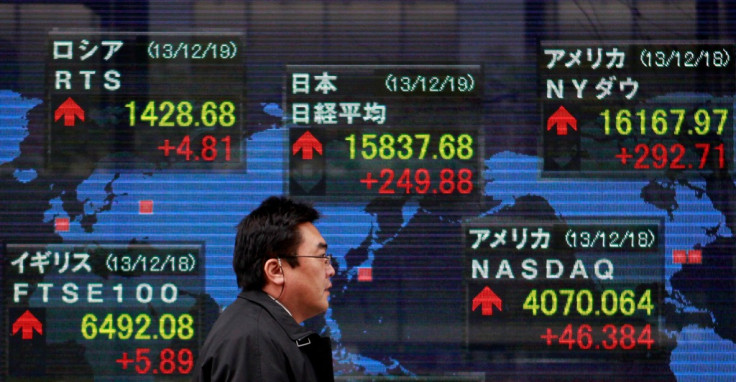Asian Markets Mixed After Federal Reserve QE Taper Announcement

Asian markets witnessed mixed trade on 19 December, with the Nikkei finishing at a six-year high, after the US Federal Reserve announced it would begin unwinding its historic bond buys.
The Japanese Nikkei finished 1.74%, or 271.42 points, higher at 15,859.22.
Australia's S&P/ASX finished 2.08%, or 106.10 points, higher at 5,202.20.
South Korea's Kospi finished 0.05%, or 1.02 points, higher at 1,975.65.
The Shanghai Composite finished 0.95%, or 20.49 points, lower at 2,127.79.
Hong Kong's Hang Seng was trading 1.37%, or 316.98 points, lower at 22,826.84.
India's BSE Sensex was trading 0.76%, or 158.32 points, lower at 20,701.54.
The Fed on 18 December said it would trim its massive monthly bond buying stimulus, rolled out over a year ago to counter the impact of the global financial crisis and boost the American economy.
The world's most powerful central bank said it would scale back its $85bn (£51.8bn, €61.8bn) a month asset buying programme by $10bn a month starting January 2014.
Specifically, the Fed would reduce its US Treasury purchases from $45bn to $40bn a month; and its mortgage-backed securities (MBS) purchases from $40bn to $35bn a month.
The Federal Open Market Committee (FOMC), the Fed's governing body, cited strong job growth in the US as the reason behind its decision.
The Fed decision weighed down on Asian currencies. The Japanese yen dropped to a near five-year low against the US dollar while Indonesia's rupiah dropped to a five-year low.
The Malaysian ringgit and the Philippine peso dropped to three-month lows, while the Indian rupee logged modest losses.
India's Finance Minister P Chidambaram said in a statement: "[The Indian] government is of the view that the [Indian] markets had already factored in the US Federal Reserve's decision and therefore is not likely to be surprised by these moderate changes."
Standard Chartered said in a note to clients: "[Fed] Chairman Bernanke hinted that further reductions of USD 10bn would continue at subsequent meetings, signalling that the FOMC looks determined to bring QE to an end within eight or nine FOMC meetings."
"Bernanke highlighted that tapering is not on a pre-set course, but in practice, we think the Fed is unlikely to be distracted by the data unless the economy weakens considerably - which we do not expect. We see bond-buying ending in October 2014 after cuts of USD 10bn at each meeting."
Standard Chartered said in a separate note: "The Fed will now focus on using its forward guidance to signal its first rate hike. At previous meetings Bernanke highlighted that there might be considerable time between the end of QE and the first rate hike."
"Still, the FOMC has now gone a step further by more explicitly tying the first rate hike to medium-term inflation expectations breaching 2%. This dilutes the 6.5% unemployment goalpost, which is left unchanged."
"But this also indicates that further heavy lifting on improving the forward guidance is left to incoming Fed President Janet Yellen. An underlying message is that the Fed is keen on maintaining some discretion in its monetary policy," the British bank added.
In Japan, the country's central bank kicked off a two-day policy meeting on 19 December.
Elsewhere, in China, the benchmark Shanghai Composite index finished at a one-month low after the seven-day repo-rate struck its highest level since June for a second consecutive session.
Wall Street Up
On Wall Street, indices closed at record highs on 18 December on the back of the Fed decision.
The Dow finished 292.71 points, or 1.8%, higher at 16,167.97, topping its 27 November record.
The S&P 500ended 29.65 points, or 1.7%, higher at 1,810.65, a record finish for the index.
The tech-heavy Nasdaq closed 46.38 points, or 1.2%, higher at 4,070.06, finishing at a 13-year high.
"Investors are looking past the taper and looking at the strength of the economy that is perceived with this news," said Chris Gaffney, senior market strategist at EverBank.
"The Fed did a great job telegraphing it to the markets, as stocks are moving in the opposite direction than you'd think," he told CNBC.
Company Stock Movements
In Tokyo, exporters stocks rallied following a weaker yen on 19 December. Gaming major Nintendo shot up 5%, industrial robots maker Fanuc gained 4%. PlayStation maker Sony and Panasonic added over 2% each.
Mitsubishi UFJ added 1.7% after it purchased a 72% stake in Thailand's Bank of Ayudhya for $5.31bn.
In Hong Kong, Shanghai-based funeral-services provider Fu Shou Yuan International soared 50.5% on its trading debut.
Kerry Logistics Network shot up 7.1% on its trading debut.
In Mumbai, software exporters gained as a stronger dollar would improve overseas margins. Infosys gained about 2% while Tata Consultancy Services added 1.9%.
However, ICICI Bank lost 2.9%.
In Sydney, oil major Caltex surged 13% even after it forecast a 30% drop in annual profits. Analysts said investors welcomed an increase in earnings at its fuel marketing business, boosted by higher sales of premium fuel.
Banking major Westpac gained 2.4%.
In Seoul, automaker Kia Motor and part-owner Hyundai Motor shed 1 and 3.7% respectively after the Supreme Court ruled that fixed bonuses should be a part of regular wage calculation.
© Copyright IBTimes 2025. All rights reserved.






















